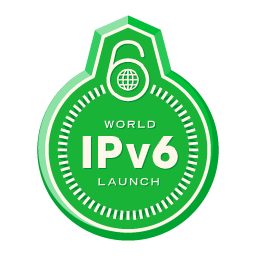On the 6th of June, the Internet is changing for ever, users will not notice but Belgium is late in the game
IPv6 Council Belgium ([http://www.ipv6council.be]) : on the 6th of June 2012, this is the World V6 Launch ([http://www.worldipv6launch.org/]) the Internet will change for ever: major Internet Service Providers (ISP) and content providers (Google, Facebook, YouTube, Bing, Yahoo! …) will deliver their content by using a new protocol called IPv6 in parallel to the existing one called IPv4 (the one used by everyone today). Internet engineers have worked for more than 15 years on this change and operations have been planned so that there should be no disruption.
Why such a change? Simply because of IPv4 addresses shortage… Pretty much like the Belgian license plates of cars had to change recently to have 7 characters rather than the previous 6 characters: to allow for more cars on the road. The same reasoning applies to IP addresses that are used to uniquely identify every client and server on the Internet. The current version allows for 4 billions devices and with the growth of Internet-enabled devices per person (laptop, tablets, smart-phones, …) and 6,8 billions of human beings on the Earth, the Internet has to do something to continue growing. The Internet engineers have simply done the same as for the license plates: getting wider addresses and replace the current IPv4 addresses (like 192.2.0.2) with much wider IPv6 addresses (like 2001:db8:aba:babe::bad:cafe — they are so wide that the very technical/geek/unusual hexadecimal notation is used!). Some regions of the world (Asia and Pacific) have already run out of IPv4 addresses and it is estimated that Europe will run out of addresses around August 2012 (in 3 months!) even if ISP have usually their own ‘stock’ which could last for several months and in some cases years.
Changing the Internet is not so easy and has taken many years… The project started as early as 1995 and engineers have changed a lot of pieces:
- applications (Firefox, Chrome, Internet Explorer, BitTorrent, ….). They are IPv6-enabled for at least 5 years
- host operating systems (Microsoft Windows, Mac OS/X, Linux, Apple iOS, Android, …) also support IPv6 for many years now
- residential & business service providers, this is more complex and is still in progress as the cable modem and other ADSL boxes (e.g. the Belgacom/Sagem box) need to be replaced or upgraded;
- core of the Internet, all routers in the Internet have been upgraded to support IPv6 for several years as well;
- servers (like web servers) and content providers: the software is ready but not always supported/deployed.
On the 6th of June at midnight UTC (which is 2 AM in Brussels), the big change is that all big content providers will deploy IPv6. It is generally assumed that more than 50% of the Internet will be reachable over this new protocol in parallel, of course, with the current one as there are still some residential and business ISP that are not yet IPv6-compatible. After 6th of June 2012, it is estimated that 1 or 2% of Internet users will use IPv6 without noticing the difference and without disruption, the remaining 99% or 98% will continue to use the current IPv4 also without any difference. There could even be an improvement in some applications, as IPv6 does not require Network Address Translation (NAT) or IP address sharing as in IPv4.
What is the situation in Belgium regarding content providers and ISPs? Well, Belgium appears late in the transition to the new Internet… In the top-50 Belgian web sites, only RTBF, KULeuven and the Federal portal (Belgium.be) are IPv6-enabled. Other noteworthy web sites that are compatible with the new protocol are Keytrade bank and Ice-Watch. The only Belgian ISP running IPv6 on a large scale is Belnet (used by Universities and High Education Schools as well as public sector). Belgacom will provide an IPv6 service for its business customers (Explore product) end of June 2012. To the knowledge of the IPv6 Council Belgium, all main residential ISPs (Belgacom, Telenet, Voo, EDPnet) are currently in pilot testing with friendly users, so, it is expected to have a wider deployment in 2013. Some neighboring countries are doing much better than Belgium see for example [http://www.google.com/intl/en/ipv6/statistics/] and [http://www.vyncke.org/ipv6status/] :
- Belgium has 0,05% of IPv6 enabled users (mainly through Belnet and Universities), while France has 4.74% (mainly through Free), Romania has 5.73%, Netherlands 0,21%, Germany 0,21%
- Belgium has 3 IPv6-enabled web sites among its top-50 sites while France has also 3 but Netherlands has 7, and Slovenia 14!
There is obviously room for improvement in Belgium…
As a residential user of the Internet: you have nothing to do on the 6th of June, you will notice nothing (it does not care whether your ISP is IPv6 compatible). But, notice that with the shortage of IPv4 addresses, you should think of selecting an IPv6-compatible ISP in the coming years if you want to keep the same experience on the Internet (the shortage of IPv4 addresses will lead to IPv4 address sharing by several subscribers that will cause some technical and security problems degrading your experience and some contents or services or applications may be only available over IPv6).
As a business user of the Internet: you also have nothing to do on the 6th of June but if your organization uses the Internet for doing business, then you should connect to the new IPv6 Internet. It is becoming more than urgent.
